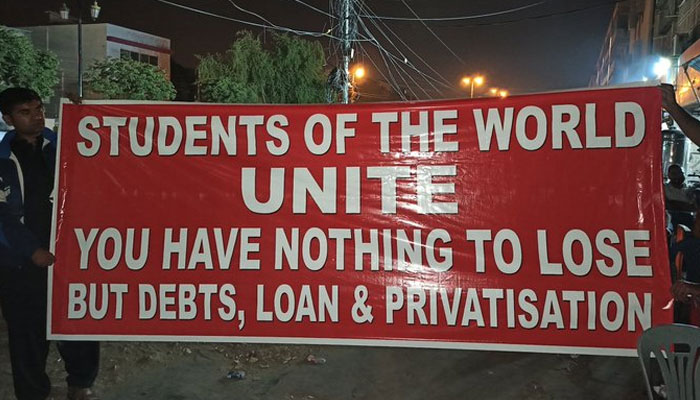Rally demands restoration of student unions, uniform educational system
Beating drums and singing revolutionary verses, chanting slogans and raising fists, hundreds of students marched on streets of the Saddar area in Karachi on Friday demanding abolition of the prevalent class-based educational system in the country, restoration of the student unions and decrease in educational fees.
In the words of a participant, Muzammil Shaikh, student of the Institute of Business Administration, “It is amazing. After 35 years, finally all the students are gathering, coming back for their rights, which should have been before but never mind.”
Talking of the country-wide hype that the hashtag #StudentsSolidarityMarch created on social media, Shaikh said wearing a wide smile, “Generally speaking [about the] whole big picture, for the last many years we have been fed a narrative that kids are apolitical but kids are not.”
It were not only students who attended the march that was held from Regal Chowk to the Karachi Press Club but a large number of political, social, environmental and human rights activists, journalists, lawyers, labourers and trade unionists also showed up at the event.
Khurram Ali, the general secretary of the Awami Workers Party in Karachi and one of the organisers of the march, explained that last year, the Progressive Students Federation (PrSF) and Progressive Students Collective (PSC) had initiated the Student Solidarity March but a very few students organisations attended it then. “We resolved to hold it bigger the next year [2019],” he said.
To observe the day this year, as many as 53 marches were held across the country, said a tweet by the PSC.
“The students’ bodies made alliances at all levels and this is how they were able to come out in such big numbers,” Ali said. “The situation of fees, especially in the private sector, is so bad that a common student has started realising that they are being exploited. Meanwhile, [the affairs] are worst in the public sector as first they [the state] cut the sports and recreational funds and now the students don’t even have transport, water and similar necessities.”
He said such state of affairs were already making the students think of coming to the streets and when the call for the march was made, the videos of students raising slogans, like those of Punjab University student Arooj Aurangzeb, went viral and created a furore, which resulted in a large number of students participating in the countrywide processions.
“Also people, especially the youth, had this impression that Imran Khan’s government will bring a change. But now after [he has been in power], they have realised that they have to come out themselves for the solution of their problems, because until there’s democracy at grass-roots level, democracy cannot benefit a common person.”
Zahabia Khozema, the organiser of the PrSF in Karachi, commented that students face many problems at their campuses and the key to their solutions is the political organisation of students so that they can gather and collectively raise their issues with the administration and the state.
“Through this rally, we demand lifting of the ban on the students unions and revoking of the recent hike in fees and no increase in them for the next five years at least. [In the recent budget] the government has cut education [funding] by 40 per cent and imposed more taxes which led to the increase in fees.”
Speaking about the lack of sexual harassment policies at the campuses, Khozema said the institutes need to make clear policies regarding harassment as the perpetrators get away easily without them. She added that the curriculum also needed to be changed and freed of hatred and extremist narratives.
She also emphasised the need for gender inclusivity in all the spheres of life. “No movement can become strong, effective and successful until the women are not involved in it. Female students need to come out and join such movements if they want to see a better tomorrow.”
Nasir Mansoor, a trade unionist who joined the march to express solidarity with the students, said all the mainstream political parties have their student wings which they use as their fuel. “But when they have to give students their due rights, these political parties deny them. They talk about democracy but don’t let the nurseries of democracy nurture.”
It was a military dictator of the country, General Ziaul Haq, who banned the student unions, Mansoor maintained. He added that although the ban has been lifted now but the political parties are replicating the dictatorial rules. “They fear that if these students and labourers united, the country would have a new leadership.”
Fashion designer and activist Mohsin Sayeed said, “Facism is always scared of people’s opinion, they are scared of people, and they use everything under the sun, every weapon under the sun to crush dissent.” He, however, was not so hopeful about things changing easily.
“But I am here. This is the way I know to live. Yes, I had thought I would never see that students would be rising. I am very happy. I feel like a student today. Whatever democracy we have today seems to be anti-people. Its threatening its own citizens, but it is very important that students are rising.”
-
 Kate Hudson Gushes Over Oscar Nomination At 21
Kate Hudson Gushes Over Oscar Nomination At 21 -
 Pink Delivers Blunt Message On Split Rumours, Calls Reports 'fake News'
Pink Delivers Blunt Message On Split Rumours, Calls Reports 'fake News' -
 Pink Separates From Carey Hart Call It Quits 20 Years After Marriage
Pink Separates From Carey Hart Call It Quits 20 Years After Marriage -
 Kanye West's Best Songs: Fans Argue Over Bold Top 10 Ranking On Social Media
Kanye West's Best Songs: Fans Argue Over Bold Top 10 Ranking On Social Media -
 King Charles Secretly Relies On Advice From THIS Royal
King Charles Secretly Relies On Advice From THIS Royal -
 Jennifer Garner Reveals Beauty Choice She Makes As Botox Alternative In Her 50s
Jennifer Garner Reveals Beauty Choice She Makes As Botox Alternative In Her 50s -
 Kate Middleton Drops Four-word Message For Young Girl After Wales Visit
Kate Middleton Drops Four-word Message For Young Girl After Wales Visit -
 Shamed Andrew Uncensored ‘massages’ Should Be Refunded To Public
Shamed Andrew Uncensored ‘massages’ Should Be Refunded To Public -
 Kylie Kelce Reveals Rules She Wants Daughter Bennett To Learn At 3: No More 'passies'
Kylie Kelce Reveals Rules She Wants Daughter Bennett To Learn At 3: No More 'passies' -
 Smartphone Market Set For Biggest-ever Decline In 2026
Smartphone Market Set For Biggest-ever Decline In 2026 -
 Mud, Rain, Loincloths: All About Japan’s 200-year-old Harvest Wrestling Ritual
Mud, Rain, Loincloths: All About Japan’s 200-year-old Harvest Wrestling Ritual -
 Jonathan Majors Set To Make Explosive Comeback To Acting After 2023 Conviction
Jonathan Majors Set To Make Explosive Comeback To Acting After 2023 Conviction -
 Next James Bond: Why Jacob Elordi May Never Get 007 Role?
Next James Bond: Why Jacob Elordi May Never Get 007 Role? -
 Maddox Drops Pitt From Surname In Credits Of Angelina Jolie’s New Film 'Couture' Despite Truce From Father's End In Legal Battle
Maddox Drops Pitt From Surname In Credits Of Angelina Jolie’s New Film 'Couture' Despite Truce From Father's End In Legal Battle -
 Meghan Markle Adds Diamonds To Engagement Ring For Jordan Trip
Meghan Markle Adds Diamonds To Engagement Ring For Jordan Trip -
 Burger King Launches AI Chatbot To Track Employee Politeness
Burger King Launches AI Chatbot To Track Employee Politeness




